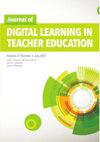Preservice special education teachers’ perceptions of mixed-reality simulation experiences
Q1 Social Sciences
Journal of Digital Learning in Teacher Education
Pub Date : 2021-11-12
DOI:10.1080/21532974.2021.1995796
引用次数: 3
Abstract
Abstract Special educators are expected to implement High-Leverage Practices to support diverse learners. This article describes the findings from a mixed-reality simulation project structured around the framework of connected learning. The project sought to evaluate how 30 preservice teacher candidates in special education feel about mixed-reality simulation compared to traditional classroom practice (i.e., role playing) in learning the High-Leverage Practice of system of least prompts. Results of this study indicate that those who participated in the mixed-reality simulator had significantly different social validity survey responses from the live practice group on items related to perceived performance, perceived tool value, and treatment experience; these findings can help inform teacher educators on how to incorporate mixed-reality simulation. Limitations and future research are discussed.职前特殊教育教师对混合现实模拟体验的感知
特殊教育工作者需要实施高杠杆实践来支持不同的学习者。本文描述了围绕连接学习框架构建的混合现实模拟项目的发现。该项目旨在评估30名特殊教育职前教师候选人在学习最少提示系统的高杠杆实践时,与传统课堂实践(即角色扮演)相比,混合现实模拟的感受。研究结果表明,参与混合现实模拟器的受试者在感知绩效、感知工具价值和治疗体验三项社会效度调查结果与现场实践组存在显著差异;这些发现可以帮助教育工作者了解如何结合混合现实模拟。讨论了局限性和未来的研究方向。
本文章由计算机程序翻译,如有差异,请以英文原文为准。
求助全文
约1分钟内获得全文
求助全文
来源期刊

Journal of Digital Learning in Teacher Education
Social Sciences-Education
CiteScore
4.90
自引率
0.00%
发文量
15
 求助内容:
求助内容: 应助结果提醒方式:
应助结果提醒方式:


